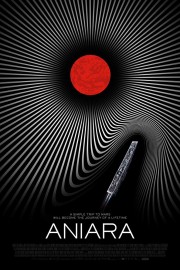Aniara
Many films have been made about people trapped in space in situations where hope seems lost- it’s a frequent sci-fi trope in Hollywood films- so it’s refreshing to actually see one such film come from a different type of source, and a perspective that focuses less on spectacle, and more on the people. “Aniara” is a film that has all the makings of a “Passengers” or “Wall-E,” but feels more in line with “Solaris,” be it the Tarkovsky film or the Soderbergh film, in how it looks at mankind faced with prospects of its own mortality. There’s a poetry to the film that is befitting its source material.
The film, written and directed by Pella Kagerman and Hugo Lilja, is actually an adaptation of a 1956 poem by Harry Martinson, and reading about the poem after watching the film, it’s kind of amazing Hollywood never tried adapting it themselves (although they’ve certainly taken cues from it). The poem tells the story of a ship, the Aniara, which has set off for Mars with passengers either looking to visit relatives, or settle into a new life on the red planet. The first image we see is a transport from Earth moving up to the ship with the passengers, as well as some of the crew, and the space craft are both familiar to genre fans, and also something different than what we are used to; the transport delivering the passengers to the Aniara seems to have a cable keeping it on course from Earth, along with the vast size it represents. After a brief introduction on the Aniara, the voyage begins, and soon after, an accident occurs that will throw the ship off-course, and adrift into space. The captain (Arvin Kananian) tries to assure passengers that they will be able to get back on course, but their three-week voyage will now become a multi-year odyssey that will test their resolve, and ability to survive.
“Aniara” has a handful of main characters we follow, but is largely seen from the perspective of Mimaroben (Emelie Jonsson), a woman who is in charge of Mima, which is an artificial intelligence room located on the ship that probes the memories and thoughts of the people in the room, allowing them to rest with familiar sights during times in their space journey. Mima is very much like the “visitors” in the adaptations of “Solaris,” but rather than showing people, Mima shows images, and the images are intended to calm the psyches of the passengers on Aniara if they grow weary. But one of the most intriguing elements of the film, and the reason Mimaroben (which is her position name; we never find out her actual name) is so important, is that Mima needs time to relax and recouperate, as well. As the journey through space extends, and more people come to Mima, its psyche becomes unhinged, and it’s Mimaroben’s task to not only help the people coming to Mima, but to help Mima recharge, as well. This leads to some of the most profound and suspenseful moments in the movie as the realization begins to sink in around the ship that a chance to change course, and return home, is less and less likely, and Mima’s chances of survival are as slim as those of the individuals on the ship. As time goes on, Mima’s fate becomes something that will inspire others to make life, and that will revive the hopes of people like Mimaroben and her lover, Isagel (Bianca Cruzeiro), at least, to a certain point.
Reading about Martinson’s poem, one understands the storytelling at work in the film as, over time, the situation becomes more helpless, and each possible chance for hope is extinguished. We see hope shine through along with tragedy. We see the purity of love and the pain of despair. We see remarkable sights that illuminate us to the wonders of science and the cosmos, and the fear that, in the grand scheme of things, we are insignificant within the cosmos, and our scientific knowledge will only get us so far. The last 30 minutes has some images and moments that stand out as, perhaps, some of the best we will get from cinema in 2019, although the emotional impact, as a whole, is not quite on the level of its ideas. But images and ideas are where sci-fi cinema is at its best, and “Aniara” has some well worth comtemplating.










